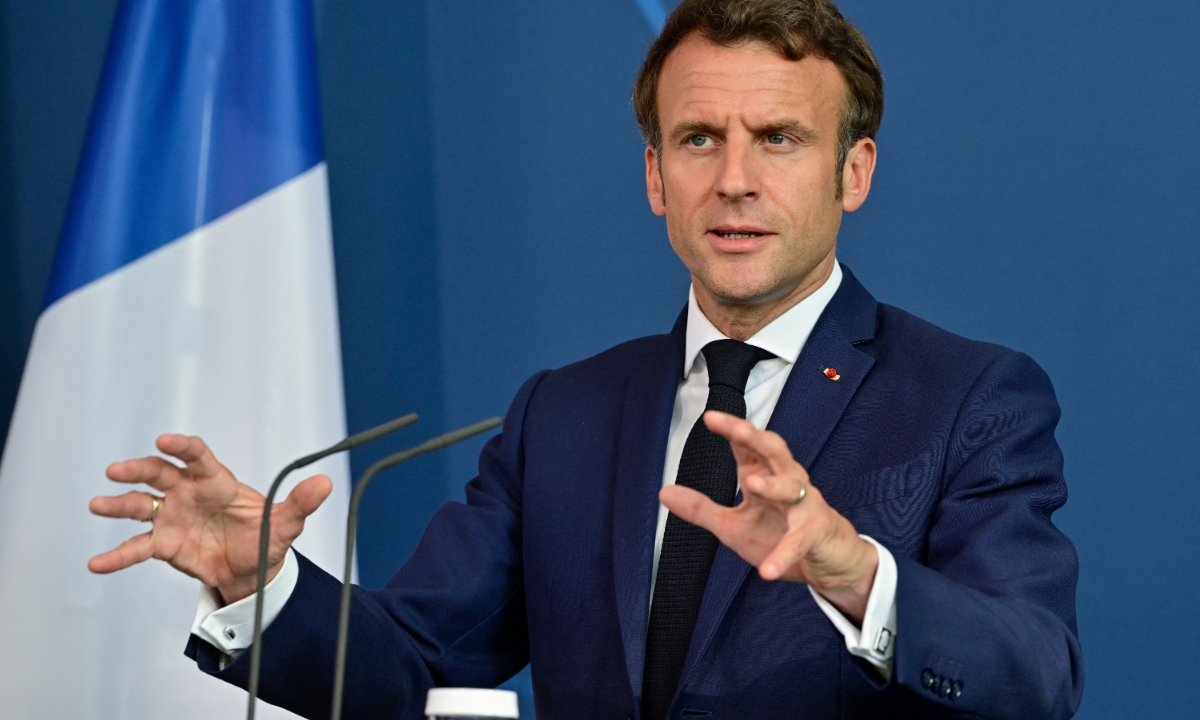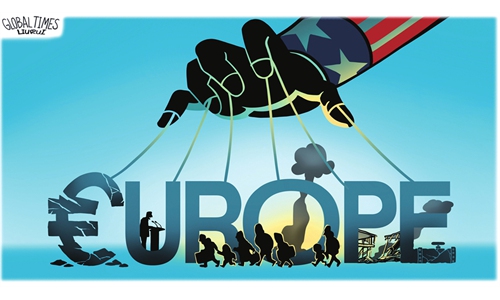
French President Emmanuel Macron
Europe is caught in an abnormal phenomenon: The more it follows the US, the weaker it becomes, leading it to follow Washington even more. Breaking free from this vicious circle is an urgent problem that European leaders must address.French President Emmanuel Macron warned French ambassadors at a meeting in Paris on Monday that as the world order changes, the situation is getting "tougher" and "more complicated," running the risk of "weakening the West and our Europe in particular."
Macron's observation is not entirely accurate: The word "risk" typically pertains to future events, but the weakening of the West is already underway. In fact, Europe and even the West as a whole have long been in a state of decline, and such a trend will not stop.
Such a crisis has deteriorated after the outbreak of the Russia-Ukraine conflict. On the one hand, against the backdrop of the war, the US-led NATO has gained more power to dominate European affairs, particularly in terms of security. Europe is now tied to the chariot of the US global hegemony system, resulting in a significant weakening of its strategic autonomy and self-awareness.
On the other hand, while the West insists on sanctioning Russia due to the war, most countries have chosen to take a neutral stance rather than follow suit. As the views and values of countries in the Global South further diverge from those of the West, a growing sense of losing control of the world is haunting Western countries.
As the West becomes gradually marginalized in the international community - a sign of weakening, it still refuses to acknowledge this phenomenon or seek its root cause. Instead, it seems that some Western countries are unable to let go of their outdated West-centric point of view. For instance, Macron in his Monday speech criticized "anti-colonialism or a perceived anti-colonialism" for fuelling anti-French sentiment, as well as an "instrumentalized anti-Westernism" from Asia to Africa.
Such a view demonstrates that some European leaders refuse to adapt to a new world, where the West is losing its domination of global order and multipolarity rules. From Asia to Africa, Europe's influence is indeed declining. This decline is largely attributed to Europe's long-standing colonialist and condescending mentality toward these countries and regions. France and other European countries haven't provided enough help to developing countries, and even when they do so, such support often comes with conditions that interfere with Africa's development based on Western ideology. In stark contrast to China's unwavering support for African countries in pursuing their own path of development, the West's approach has made it even more untrustworthy.
In addition to West-centrism, blindly following the US has also trapped Europe in the quagmire of weakening itself. Europe has become a pawn of the US, serving to maintain and expand Washington's global dominance. In response to the rise of developing countries like China, Europe has adopted a confrontational and Cold War mentality. Under the comprehensive plan of the US, European strategic autonomy today has almost become merely an empty concept. Europe has no one to blame but itself for its weakened position.
Europe is now caught in a dilemma. On one hand, Europe is part of the US-led Western alliance, in which it enjoys a portion of institutional dividends. On the other hand, it is worth noting that Europe is not the dominant force in the alliance; the US is. Washington reaps most of the benefits from the alliance while shifting more costs and risks onto Europeans. Europeans must determine on their own whether it is worthwhile to move closer to the US.
Last week's BRICS summit shows us the rising influence of developing countries. Global South countries now don't need to rely on biased and ideologically-driven aid and support from the West. They can also embark on a development path that is independent and suits themselves the best. If Europe wishes to avoid weakening itself it should embrace multipolarity and strengthen its strategic autonomy.
"If Europe truly wants to take the 'third way,' as Macron suggests, then the continent should become more open and tolerant, demonstrate united will and the capacity to take practical actions, and keep pace with global trends," said Gao Jian, a scholar at Shanghai International Studies University.

